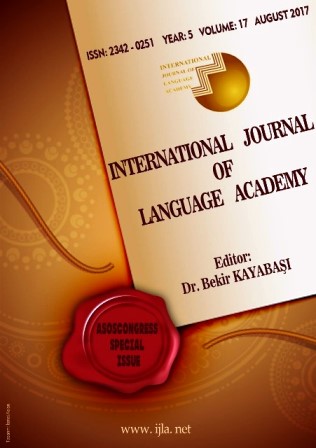Author :
Abstract
Bu çalışmada, engellilik ile ilgili yapılan son çalışmalar ışığında, engellilik kavramının söylemsel eylemler yoluyla imal edildiği iddia edilmektedir ve engellilik ile ilgili algıların onu fiziksel bir durum olarak düşünmekten öteye geçmesi gerektiğine inanılmaktadır. Eylem (practice) kelimesi söylemsel kelimesiyle birlikte, dilin sosyal konuların oluşturulmasında ve kimlik, güç ve ideoloji gibi belirli kavramlar temsil edilirken onun nasıl etkili olduğunun altını çizmek amacıyla, kasten kullanılmıştır. Engellilik ile ilgili yapılan son çalışmalar, beden kavramının geleneksel algısını eleştirmektedir ve beden algısının üzerindeki sosyal, kültürel ve politik etkilerin de düşünülmesi gerektiğini iddia etmektedir. Böylece, engellilik fiziksel bir durum olarak değil de “çoğunlukla yaşanılması zor olan bir dünya ile etkileşime geçme yolu olarak” yani “hali hazırda olan bir şey değil, birinin yaptığı bir şey” olarak görülmelidir. Edebiyatta, feminist yazın haricinde, beden kavramı ile ilgili yazılar onun geleneksel temsilinden öteye geçmemiştir. Şüphesiz ki, beden kavramının edinimsel olması anlayışını yansıtmak için en iyi yer tiyatro sahnesidir. Geleneksel kavramları ters yüz etme amacı taşıyan avangard tiyatronun ortaya çıkışıyla birlikte, tam bir bütün olarak algılanan beden düşüncesi sorgulanmıştır. Avangard tiyatroda parçalar halinde olmaya vurgu yapılır ve Samuel Beckett bütünlük fikrini en iyi ters yüz eden yazarlardan biridir. Yazarın, ifadesiz bir yüzle, hareketsiz bir kadın bedenini ortaya koyduğu Rockaby adlı oyunu, genel anlamda beden üzerine ve belirgin olarak da kadın bedeni üzerine dayatılmış bütün etiketlemeleri yok eder. Bununla birlikte, bu oyun, bedeni genel olarak kabul gören bir çerçevede temsil etmeyi reddederek, engelli bedeni algısında aynı amaca sahip olan bu çalışmanın bulguları için önemlidir.
Keywords
Abstract
In this study, under the light of the recent studies on disability it is claimed that the concept of disability is constructed through discursive practices and it is believed that perceptions on disability must go beyond thinking it as a physical condition. The word practice is used intentionally together with the word discursive in order to underline how language is effective in the formation of social issues and how it stimulates actions that are the representations of the key concepts such as identity, power and ideology. The recent studies on disability criticize the traditional approaches to the body and claim that one must consider the influence of social, cultural and political inscriptions on the body. Thus, it is suggested that disability should be considered not as a physical condition but as “a way of interacting with a world that is frequently inhospitable” that is “as something one does rather than something is” (Sandahl & Auslander, 10). In literature writing the body, except for the feminist writing, does not go beyond the traditional representation of it. Undoubtedly, the theatre stage is the best place to reflect the performative understanding of the body. With the rise of avant-garde theatre that seeks to subvert the traditional norms, the questioning of the idea of the body that is thought full and complete has been arisen. In avant-garde theatre there is an emphasis on fragmentariness and Samuel Beckett is among the best representatives of this subversion of the idea of completeness.. His play Rockaby, through which he portrays a motionless body of a woman with expressionless face, annihilates all of the imposed labels on the body in general and on the female body in particular. Moreover, the play by rejecting to represent the body in a generally accepted framework serves to the findings of this study that has the same purpose in the consideration of the disabled body.
Keywords
- Auslander, Philip and Sandahl, Carrie (2005), Bodies in Commotion : Disability and Performance, Michigan: U of Michigan P.
- Beckett, Samuel (1981). Rockaby. New York: Grove Press.
- Butler, Judith (1993). Bodies That Matter: On the Discursive Limits of Sex. New York: Routledge.
- --- (2004). Undoing Gender. New York: Routledge.
- Çakırtaş, Önder and Ömer Şekerci (2014). ―Developmental Psychology Rediscovered: ‗Negative Identity‘ and ‗Ego Integrity versus Despair‘ in Samuel Beckett‘s Endgame. International Journal of Language Academy. 2:2, 194-203.
- Drew Leder (2007) The actor's b:ody: Symposium reflections, Contemporary Theatre
- Hall, Kim (2002). ―Feminism, Disability, and Embodiment‖, NWSA Journal, 14:3, vii-xiii.
- Harradine, David (2000). ―Abject Identities and Fluid Performances: Theorizing the Leaking Body‖. Patrick Campbell (ed). The Body in Performance. Contemporary Theatre Review. 10:3.
- Jeffers, J. M. (2012). Samuel Beckett: A Casebook. New York. Routledge.
- Joan Lipkin & Ann Fox (2001) The disability project: Toward an aesthetic of access, Contemporary Theatre Review, 11:3-4, 119-136, DOI: 10.1080/10486800108568642
- Jones, Cristine (2012). Bodily Functions: A Reading of Gender Performativity in Samuel Beckett‘s Rockaby. Jennifer M. Jeffers (ed). Samuel Beckett: A Casebook. New York: Routledge.
- McWhorther, Ladelle. ―Foreword.‖ In Foucault and the Government of Disability ed. Shelley Tremain,xiii-xvii. Ann Arbor: University of Michigan Press, 2005.
- Kuppers, Petra (2001) Deconstructing images: Performing disability, Contemporary Theatre Review, 11:3-4, 25-40, DOI: 10.1080/10486800108568636
- Samuels, Ellen (2002), Critical Divides: Judith Butler’s Body Theory and the Question of Disability. NWSA Journal, 14:3, 58-76.
- Shakespeare, Tom and Nicholas Watson (2002). ―The Social Model of Disability: an Outdated Ideology?‖. Research in Social Science and Disability. 2: 9-28.
- Spackman, Helen (2000). ―Minding the matter of representation: Staging the body (politic)‖, Contemporary Theatre Review, 10:3, 5-22, DOI: 10.1080/10486800008568593
- Tatum, Jeffery D., (2001). ―A Bibliographic Essay on the Body‖. The Hedgehog Review, 3:2.
- Thomas, C. (2004). ―How is disability understood? An examination of sociological approaches‖. Disability & Society, 19: 569–583. doi:10.1080/0968759042000252506.
- Tremain, Shelley, ed. (2005). Foucault and the Government of Disability. Ann Arbor: University of Michigan Press.
- Val, Taylor (1997) Body in mind: Exploring pre‐ expressivity, Contemporary Theatre Review, 7:1, 1-10, DOI: 10.1080/10486809708568440
- Yüksel, Ayşegül. ―Man‘s Post-Tragic Position in Beckettian Drama‖. Web. http://www.ide.hacettepe.edu.tr/ekitap2/5.pdf. Accessed: 01.08.2017.





